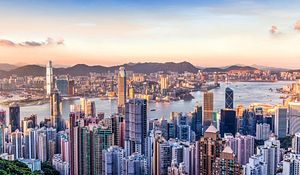If Denise Ho wasn’t a high profile figure beyond the fans of Cantopop outside of Hong Kong before, the claimed antics of one of the companies that sponsors events she is associated with over the last few weeks have ensured that she now has global profile. French cosmetics giant Lancôme reportedly scrapped a promotional event at which she was due to sing in the city this month due to her clearly stated support for both the Occupy Central movement of two years ago, and a meeting she held with the Dalai Lama.
Politicians and celebrities (when the latter are not trying to morph into the former) always have a tetchy relationship with each other. In the halcyon days of British New Labour two decades ago, the then-Prime Minister Tony Blair, capitalizing on his photogenic youth and popularity, got involved with an ill-advised “Cool Britannia” fad. A number of receptions which pitched image-obsessed leaders against unruly, often ungrateful and unpredictable pop stars and actresses followed, culminating however in the iconic scene of the then-deputy prime minister, John Prescott, having a bowl of ice water dumped over his head by one of the over-exuberant “golden youth” singers he was trying to court. After that point, the two groups happily retreated to their own realms – the politicians largely did the politics, and celebrities got on with creating and entertaining. Modern societies, after all, should have plenty of space for both groups.
Modern China hasn’t worked out that division. Creative figures aren’t accorded a neutral public space where they can operate free from official disapproval if their personal opinions displease authorities. And while Denise Ho is unlikely to physically dump ice water over a Chinese politburo member trying to court her any time soon, Lancôme is not alone in having trouble balancing the urge to use local, popular, trendy stars to try to push its products in Mainland China with having to calculate just how much pressure or pain it can take when authorities start to take punitive actions.
On the surface, Lancôme can argue that they are focusing on only one thing: flogging as much of their products as they can. They can concentrate on the blissful simplicity of the bottom line. But of course, things are not so straightforward. For the company’s public image, dropping figures because of their personal opinions is a lose-lose game. Whatever the reasons for their loss of enthusiasm for the promotional event, the court of public opinion outside of China, as it is euphemistically labeled, has already called judgment. Lancome is kowtowing, showing moral cowardice, and proving themselves wholly culpable, the accusation goes.
In this “court of public opinion,” at least it might be said in mitigation to Lancôme that the group really shaping this whole debate are the ones that have said the least – the anonymous “authorities” in Beijing whose actions Lancôme and others are constantly having to second guess. Chinese government opacity has always been one of the qualities it most prizes about itself. So there are now armies of advisers, diplomats, and strategic thinkers, inside and outside China, who are being asked to second guess what potential responses this vast black hole of decision making might give to any action a company or government might take. Unsurprisingly, the default is more often than not to take the route of lowest risk. Only the blandest, most trouble-free approach is likely to ever be recommended. No one, after all, wants the dreaded accusation of “offending the feelings of 1.3 billion Chinese people,” the usual cliché leveled at those deemed to have erred.
There is a price for this, however. For a government that declares at every possible opportunity that it wants innovation, creativity, and fresh thinking, the real message coming from an incident like this is that Beijing wants these qualities only in the most circumscribed, limited area. So sciences, technical processes, economics (up to a point) – these are all permissible areas of free inquiry. But woe-betide anyone who wants to stray into the more tendentious areas, of which there are plenty. For artistic creativity, the restrictions are clear enough. Political creativity is the least welcome of all.
The case of Denise Ho might be a flash in the pan. But it illustrates well how everyone in the current situations comes off badly. For Lancôme, its reputation suffers and it looks underhanded and hypocritical – wanting “cool” events but only with people with predictable, establishment opinions. For the Chinese government, it shows Beijing has created an atmosphere where it is stifling, not encouraging, creativity; and that there will be a payback, because trying to aim for innovation in one area while clamping down on others is an incoherent, unsustainable strategy. Something eventually has to break.
The worse outcome, however, is the politicization of the purchasing power and global importance of Chinese consumers. They figure as a weapon in the mission of the Chinese state to enforce, if not acceptance of its views abroad, at least compliance with them. The message is clear. If you want to securely lay claim to the expenditure of this group, then you have to make the assumption that their politics matters to their wallets, and that they will not spend on companies associated with messages against what they are told are their national interests, often by their own government (through state media).
For that reason, like it or not, foreign companies sit on the front line of resistance. If they want their creative, dynamic products to succeed in China, they should not try to promote them in an uncreative, undynamic ways – and that means not dumping potentially contentious figures or ducking hard messages. In the short term, of course, they may suffer. But surely, in the long term, an open, creative Chinese market is better than one stymied by fear, political prescription and second guessing, and this sort of company approach is the likeliest route to achieve that.

































